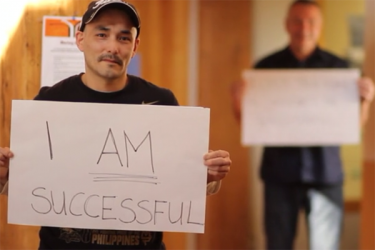Article Origin
Volume
Issue
Year
Edmonton’s downtown Bissell Centre is making a positive impact on the lives of many people with its FASD program.
The treatment strategy is helping to eliminate or lessen the occurrence of babies being born with Fetal Alcohol Spectrum Disorder. But it is also helping adults who have been diagnosed with the often-disabling disorder.
“Every year in September is International FASD day so we feature different activities on the ninth day of the ninth month, representing the nine months of pregnancy,” said Alaina Thursby, FASD community educator at the centre. “The last couple of years we’ve engaged in a flash mob, trying something different to get people interested. A lot of times, the past information and resources were on the doom and gloom so we’re trying to send the message that even though it is a very severe disability we try to focus on strengths and capabilities and on people being supported and becoming successful.”
Clients of Aboriginal heritage who come to the Bissell Centre with FASD-related problems are referred to sharing circles for additional help, and to upcoming cultural events such as round dances and pow wows.
“Whatever they are looking for we can help make those connections because culture is a big part of people’s lives,” said Thursby. “Staying connected or getting re-connected with traditions and beliefs from one’s heritage go a long ways in the healing process.”
A series of videos that brings the message home in a way that young people can relate to was recently produced and posted on youtube.
“These videos are the most recent addition to our educational materials,” said Thursby. “We are trying to raise awareness in the community to everyone that alcohol and pregnancy don’t mix.”
Even with all the awareness surrounding FASD, the number of babies being born continues to be high.
“That’s a surprise to a lot of people because we think it’s common sense for a woman to refrain from drinking alcohol when she’s pregnant. But sometimes it’s more complicated than that, and people shouldn’t point fingers and blame the mothers-to-be, because there is more going on in their lives,” she said.
Some women can’t stop drinking, especially without support which may not be present. “We want people to know that the support they need can be found at Bissell.”
In addition to one-on-one advocacy, Thursby said that individuals receive assistance in many ways, from helping them to get child care so they can return to school or work, to finding appropriate housing.
“Basically, we cover a lot of areas,” she said.
People with FASD can have physical, mental, behavioural and learning problems. FASD has become the leading cause of disabilities in Canada with approximately one percent of the population affected, according to a 2004 report from the Alberta Alcohol and Drug Commission.
- 2584 views

